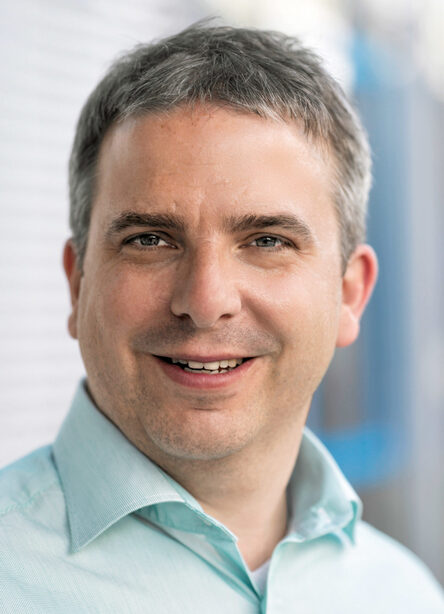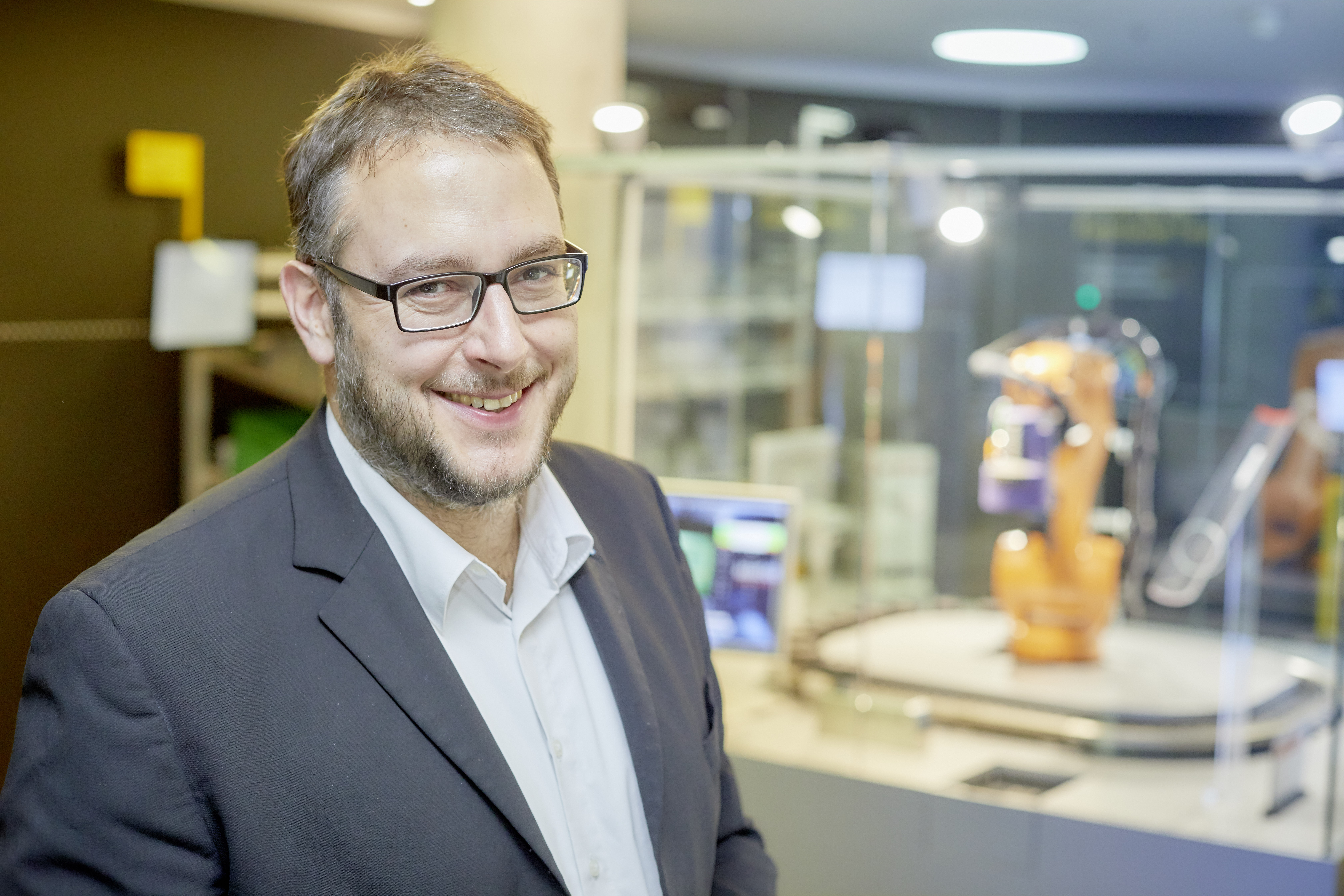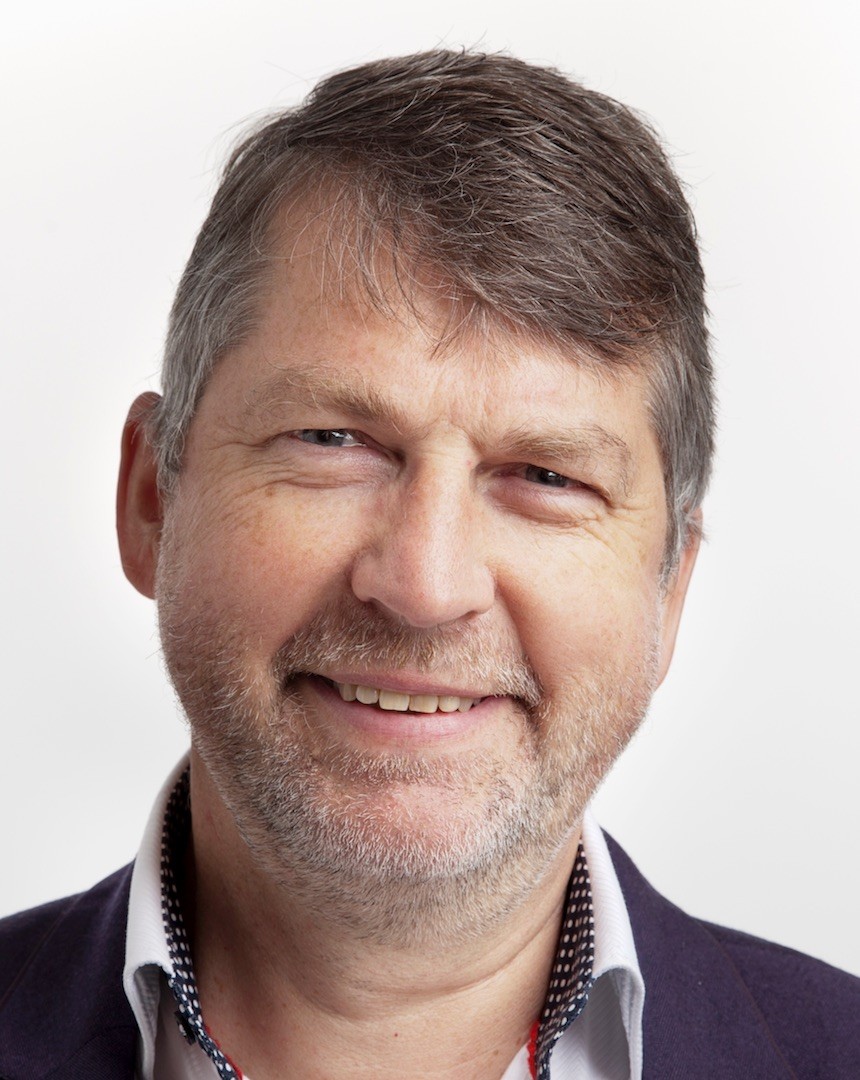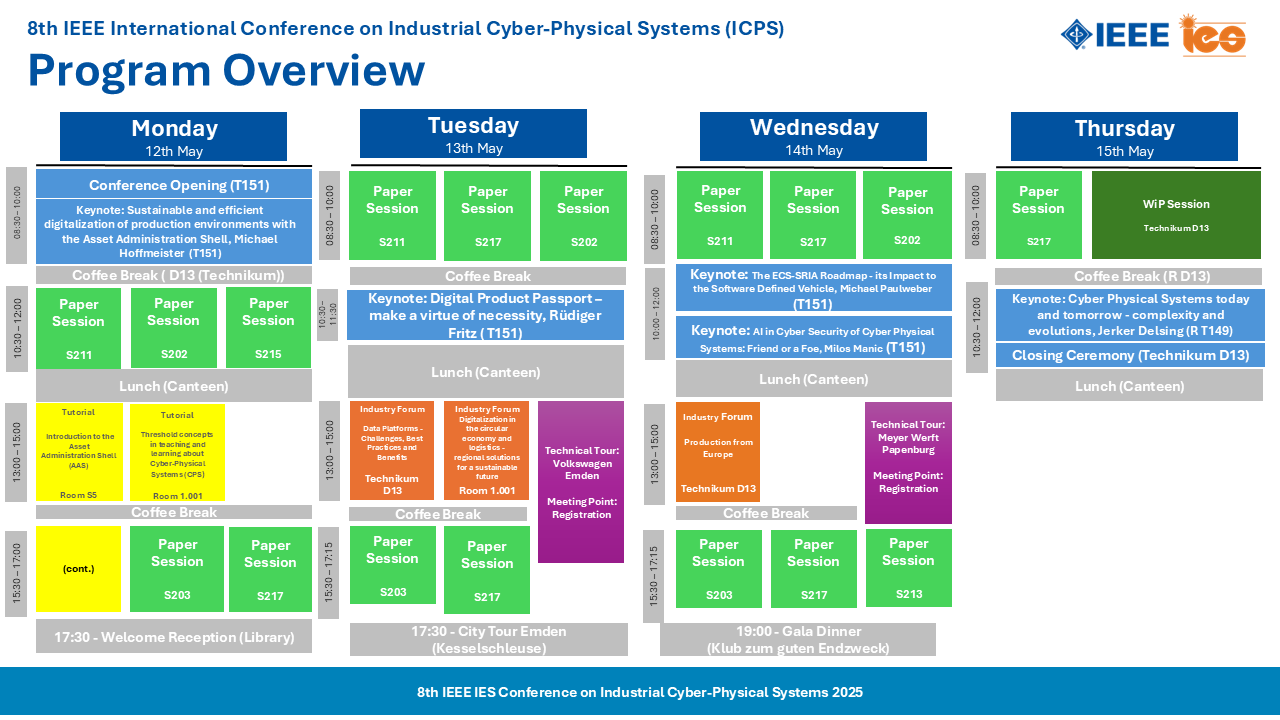Program Overview
See the detailed conference program below
Keynote Speakers





Keynote: Sustainable and Efficient Digitalization of Production Environments with the Asset Administration Shell
Prof. Michael Hoffmeister FESTO, IDTA, HKU
Monday, 10:30am, Room T151
Abstract: How to create business potential in the future of production? This keynote will discuss strategically important factors of creating digital twins and how to address these through standardization and interoperability. The talk will introduce the main concepts of the Asset Administration Shell and how these are related to potential business benefits for future applications. Important directions in open source software and standardization, e.g., for the potential Digital Product Passport, will be reflected. The talk will address skills, tools, and methodologies, which will become relevant soon.
Speaker Bio: Prof. Dr. Michael Hoffmeister is a professor at the Karlsruhe University of Applied Sciences (HKA) in the field of mechatronics and is a researcher with Festo, which is an internationally renowned manufacturer of industrial components. He is a known driver of the AAS in Industry 4.0, is a board member of the IDTA, heads the IDTA working group for Submodels, and is convenor of the respective IEC 63278 standard for the AAS.
Keynote: Digital Product Passport – Make a Virtue of Necessity
Rüdiger Fritz Twindustrial GmbH, Germany
Tuesday, 10:30am, Room T151
Abstract: For manufacturing companies, the future Digital Product Passport is an opportunity, not another bureaucratic burden. With smart ideas and an innovative mindset, companies can improve their product and their processes, can outperform their competitors, and gain substantial benefit from this bureaucratic deliverable. Let’s explore these bold theses and get inspired by some impulses to think out of the box and start to implement a system solution instead of a quick point solution, short before the DPP becomes mandatory
Speaker Bio: Rüdiger Fritz, an industrial engineer educated at the Karlsruhe Institute of Technology (KIT), brings over 25 years of experience in the IT industry, including 23 years at SAP, where he held roles such as Development Architect and Senior Director for Product Management in Supply Chain Management. A passionate advocate for Industry 4.0, the Digital Product Passport (DPP), and Digital Twin technologies, he is now co-founder of Twindustrial GmbH, which is an innovation-driven company dedicated to redefining the potential of Digital Twins to develop forward-thinking industrial solutions. Rüdiger’s career reflects a deep commitment to shaping the future of digital transformation in manufacturing and supply chains.
Keynote: The ECS-SRIA Roadmap – its Impact to the Software Defined Vehicle
Dr. Michael Paulweber INSIDE Industry Association / AVL List, Austria
Wednesday, 10:00am, Room T151
Abstract: ECS-SRIA is the Electronics Components and System Strategic Research and Innovation Agenda. Why this ECS-SRIA? The range of this ECS-SRIA is very wide, going from transistors within silicon chips acting as individual electrical switches for integration in smart systems up to global System of Systems performing complex cognitive tasks and interacting with numerous humans and machines over a wide geographical spread. The first part of the ECS-SRIA is composed of four chapters focused on the Foundational Technology Layers and their technical challenges along the technology stack, from materials and process technology to components, modules and their integration into electronic systems, embedded software developments and software technologies, to full systems and Systems of Systems. These foundational layers are characterised by hierarchical dependencies due to the inherent nature of ECS and the way they compose and integrate in complex structures. Advances in all Foundational Technology Layers will be essential to creating new electronic chips, components, modules, systems, and systems of systems along the value chain: these are the fundamental elements required to build the digitalisation solutions of the future.
Speaker Bio: Michael Paulweber has over 40 years of experience in the automotive industry, working with AVL List GmbH in Austria and the USA. He currently serves as Executive Adviser for Software-Defined Vehicles (SDV) and ADAS/AD software development. He holds a Master’s and PhD in Control Theory from Graz University of Technology and earned an Executive MBA from St. Mary’s College of California in 2008. After starting his career at Graz University of Technology, he joined AVL in 1982. By 1987, he led development for test system automation and control, helping establish AVL’s global leadership in this domain. Dr. Paulweber has deep expertise in automotive testing, embedded software platforms, and development toolchains. In 2012, he became Director of Global Research and Technology Management for AVL’s Instrumentation and Test Systems division. Since mid-2022, he has focused on SDV and the European Chips Joint Undertaking in his advisory role. He is Vice President of the European industry association INSIDE, Vice Chairman of ESBS Austria, and serves on the steering board of the European Chips JU and the Sherpa governance board for the SDVof initiative. He also lectures at Graz University of Technology and the University of Applied Sciences.
Keynote: AI in Cyber Security of Cyber-Physical Systems: Friend or a Foe
Prof. Milos Manic IEEE IES President (2024-2025), Virginia Commonwealth University (VCU), USA
Wednesday, 11:00am, Room T151
Abstract: Recent advancements in Artificial Intelligence (AI) have created unprecedented opportunities for real-time monitoring and understanding of the behavior and health of complex systems. However, the use of AI for anomaly detection and intrusion prevention often come with a “warning label”. This talk will explore the latest developments in AI through real-world case studies, reflecting on both best practices and challenges in designing effective AI systems. We will examine scenarios involving both large and limited datasets, discuss the integration of human expertise and physics-based models, and emphasize the critical role of effective visualization and explainability in the deployment of trustworthy AI solutions. This interactive talk will begin with the fundamentals of neural networks and deep learning, explore global trends in AI for Cyber-Physical Systems (CPS), and conclude with an overview of the IEEE Industrial Electronics Society (IES), highlighting opportunities for engagement with the world’s largest professional organization.
Speaker Bio: Dr. Manic is a Professor with the Computer Science Department and Director of VCU Cybersecurity Center at Virginia Commonwealth University. He completed over 60 research grants in AI/ML in cyber and energy and intelligent controls. He authored over 250 refereed articles in international journals, books, and conferences, has given over 70 invited talks around the world, holds several U.S. patents and has won 2018 R&D 100 Award for Autonomic Intelligent Cyber Sensor (AICS), one of top 100 science and technology worldwide innovations in 2018, and is recipient of the 2023 FBI DCLA Director’s Community Leadership Award for innovative research in AI & cybersecurity. He is an inductee of the US National Academy of Inventors (senior class of 2023, member class of 2019), and a Fellow of the Commonwealth Cyber Initiative (specialty in AI & Cybersecurity). He holds a Joint Appointment with Idaho National Laboratory. He is an IEEE IES President (2024-2025), after serving in multiple IES officer positions, IEEE Fellow (for contributions to machine learning based cybersecurity in critical infrastructures), recipient of IEEE IES 2019 Anthony J. Hornfeck Service Award, 2012 J. David Irwin Early Career Award, 2017 IEM Best Paper Award, associate editor of IEEE Transactions on Industrial Informatics, IEEE Open Journal of Industrial Electronics Society, and IEEE IES Senior Life AdCom member. He served as AE of Trans. on Industrial Electronics, was a founding chair of IEEE IES Technical Committee on Resilience and Security in Industry, and was a General Chair of IEEE ICIT 2023, IEEE IECON 2018, IEEE HSI 2019.
Keynote: Cyber-Physical Systems Today and Tomorrow – Complexity and Evolutions
Prof. Jerker Delsing Luleå University of Technology, Sweden
Thursday, 10:30am, Room T149
Abstract: Today’s Cyber Physical Systems are most often discussed in terms of small isolated interactions between our physical world and our digital world. This is now evolving towards System of Cyber Physical Systems - SoCPSs. We will see both cyber digital and physical interaction and feedback loops across our SoCPSs. It’s easy to imagine that our SoCPS will rapidly grow to a very large number of interactions between CPSs, just imagine an airport, a mine, or a smart city. Each of these examples will have a life cycle of many decades or even centuries. Comparing this to the life cycle of digital cyber parts (software and hardware) with a lifetime of 10 years for the hardware and maybe months for the software part indicates that evolution will be at hand, and with this, emergent behaviors. How can such complexity be handled by organizations and cyber machines? Information interoperability and understandability will become critical to proper evolution management. A related question is how cyber machines can evolve potentially autonomously to keep and evolve our SoCPSs performance without engineering and maintenance costs becoming the big bottleneck.
Speaker Bio: Prof. Jerker Delsing received 1988 a PhD degree in Electrical Measurement from Lund University. In 1994, he was promoted to associate professor in Heat and Power Engineering. In 1995, he was appointed chair professor in Industrial Electronics, renamed to Cyber Physical Systems at Luleå University of Technology. His research profile is CPS/SoS engineering automation. Prof. Delsing has engaged in large EU projects, e.g., IMC-AESOP, Arrowhead (coordinator), Productive4.0 (WP lead), Arrowhead Tools (coordinator), AIMS5.0 (WP lead), Arrowhead fPVN (coordinator) Prof. Delsing is vice president and board member, INSIDE Industry Association, and board member, ProcessIT Innovations.
Tutorials
- TU1: Introduction to the Asset Administration Shell (AAS)
- TU2: Threshold concepts in teaching and learning about Cyber-Physical Systems (CPS)
For detailed information about the Industry Forum, please check the Tutorials page
Industry Forum
- IF Session 1: Data Platforms – Challenges, Best Practices and Benefits
- IF Session 2: Digitalization in the Circular Economy and Logistics – Regional Solutions for a Sustainable Future
- IF Session 3: Production from Europe
For detailed information about the Industry Forum, please check the Industry Forum page
Social Events
Welcome Reception
Monday, 17:30 (University Library)
The Welcome Reception will be held at the University’s library and will provide a opportunity to connect with other fellow conference participants and to have fruitful discussions while enjoying some drinks and finger food.
City Tour
Tuesday, 17:30 (Kesselschleuse) The conference will offer a guided city tour through Emden’s city center on Tuesday, 13th May at 17:30 (meeting point: Kesselschleuse).
Experience Emden’s Fascinating History on a Unique City Tour! Begin your journey at the Kesselschleuse, the heart of Emden’s maritime history, where you’ll learn how this remarkable structure regulates the harbor facilities and transformed the city into a vital trade hub. From there, the tour takes you along the Emden Wall and through preserved parts of the historic old town.
At the Delft, one of the oldest harbor basins, you’ll dive into Emden’s seafaring legacy. Here stands the Emden City Hall—a symbol of citizen self-governance and the 16th-century revolution that politically reshaped the region. The tour concludes at the Great Church, a testament to Emden’s religious significance. Along the way, you’ll explore Emden’s history during the Nazi era, which led to destruction in World War II, and the city’s democratic post-war reconstruction.
Highlights include: Insider tips on Emden’s best restaurants, offering traditional East Frisian cuisine and fresh seafood. A journey through 800 years of history, from maritime trade and revolution to resilience after war. Route: Kesselschleuse → Emden Wall → Historic Old Town/Delft → Emden City Hall → Great Church Duration: 90 minutes Language: English/German (specify preference) Tips: Wear comfortable shoes and bring curiosity! Discover how Emden’s past shapes its vibrant present.
Gala Dinner
Wednesday, 19:00 (Klub zum Guten Endzweck)
Join us for an unforgettable evening at the Conference Gala Dinner taking place at the “Klub zum Guten Endzweck” in the city center of Emden, a highlight of our event that offers the perfect setting to relax, connect, and celebrate with fellow attendees. Set in an elegant venue, the Gala Dinner combines fine dining, entertainment, and networking in a sophisticated yet welcoming atmosphere. Please note, that the participation at the Gala Dinner is only included for participants with full registration.
The planned menu for the dinner can be found here. To drink, we offer water and wine as well as up to two drinks from the menu for free (hard alcoholic drinks and cocktails excluded). Additional drinks or special requests need to paid extra. If you have any special dietary requests or questions regarding ingredients, please get in touch by Thursday 8th May in order for us to be able to incorporate your request.
Technical Tours
Throughout the conference, we will offer the following technical tours
- Volkswagen plant, Emden Tuesday, 12:45 – 16:00:
The Volkswagen plant in Emden, Germany, is one of the company’s key production sites. Established in 1964, it has primarily produced mid-size and premium vehicles, including the Passat. In recent years, the factory has undergone major upgrades to support Volkswagen’s shift toward electric mobility and now also manufactures electric vehicles like the ID.7. Located near the North Sea, the plant benefits from its own port facilities for efficient vehicle export. - Meyer shiphyard, Papenburg Wednesday, 13:00 – 16:30:
The Meyer Werft shipyard, located in Papenburg, Germany, is one of the world’s leading builders of cruise ships. Founded in 1795, it has a long tradition of shipbuilding and is known for its advanced technology and innovative design. The yard constructs large, ocean-going vessels in a covered building dock, which allows for year-round production. Meyer Werft delivers ships for international cruise lines and is a key player in the global maritime industry
Unfortunately, all slots for participation to the technical tours are already booked.
